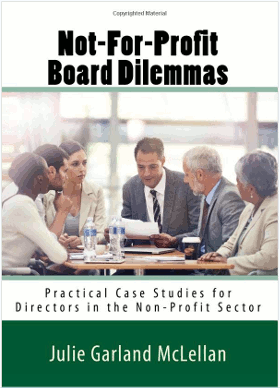Book review - Not for Profit Board Dilemmas by Julie Garland McLellan
ISBN 978-1502862389
Paperback 224 Pages

If you enjoy this newsletter you will love this book. It includes a selection of boardroom dilemmas featuring modern governance problems and offering a range of innovative solutions. There are also unanswered dilemmas so that you can test your judgement without outside assistance.
Order now as a great Christmas gift for your board colleagues or for your own 'self-gift'!
Available at Amazon.com in paperback and Kindle editions.
Here's what Carter McNamara had to say about it:
I've read probably 90% of the books out there about Boards, and very few really portray the ambiguous nature of the issues that Boards face - this book does. Other books sometime depict success in the Boardroom as a matter of following the right procedure. That's like believing there's a procedure for ensuring a high-quality marriage. The case studies in this book should be used for discussions, not only in business schools, but in Boardrooms. High-quality Board members have developed a wisdom - a sense of high-quality judgement - and also a humility about that wisdom. This book portrays both.
Carter McNamara, Co-Owner, Authenticity Consulting LLC
What's New - In November
A highlight of the month was attending the Naval Fleet Reception on board the HMAS Canberra. It was a fascinating insight into the lives and activities of our protective naval force.
The board of Fitness Australia was able to complete its acquisition of Filex and I can finally let you all know why I have been so busy and yet unable to explain what I was doing!
The initial Advanced Club Governance course was delivered for Clubs NSW and well received by all participants. I am looking forward to re-running the course and to delivering it in regional locations. I delivered some courses for the AICD and developed a 'Women's Leadership in the Boardroom' course which will focus on leading through periods of disruption to be delivered with I E Business School and AGSM. I also delivered some leadership modules in collaboration with Phil Preston, one of Australia's leading proponents of shared value strategy. In addition to MCing and starting to celebrate the festive season (early) with my many friends and colleagues at AICD and other governance institutions.
Finally I started to contemplate the forthcoming holiday season and a much anticipated rest with family. I hope that you will have a great Christmas and New Year and look forward to resuming communication in the next dilemma - due on 1 February.
I am always keen to work more and will be delighted to hear from you if you would like to arrange some board education or a performance review during these quieter months!
Inspirational quote for December - This month my favourite quote is:

A note on names - A few readers have asked me where I find the names for the protagonists in each case study. I can only say that I 'borrow' them from people I meet or things that I read. Victoria is the Latin word for victory. The Roman goddess Victoria corresponds to the Greek goddess of victory Nike. Our protagonist Victoria will need to get her Nikes on and address this problem before it festers and erupts into the community beyond the board and Minister’s office. Decisive and courageous decisions are the only way out of this mess.
Readers doing Interesting Things - Henri Eliot of Board Dynamics has written a thought-provoking blog on Fintech and the implications for boards. You can share his insights here.
Recommended video - The Operational Risk Handbook (Harriman House, Great Britain) is unique in taking a performance-driven approach to managing risk. This is in stark contrast to static and reactive control-based methods. The Handbook includes perspectives from 6 bank board members who also had experience in non-financial companies. The members hail from banks of all sizes from a small de novo bank to bigger banks, and the Federal Reserve. The performance-driven way continues to demonstrate its endurance and value. Recently, SarderTV released a new video covering
highlights from The Handbook.
This newsletter - If you have any ideas for improving the newsletter please let me know. If you are reading a forwarded copy please visit my website and sign up for your own subscription.
Suggestions for dilemmas - Thank you to all the readers who have suggested dilemmas. I will answer them all eventually. I could not write this newsletter without your help and without the generous help of all the experts who respond each month to the case studies.
Be a contributor - if you would like to attempt a response to the dilemmas for publication you will be most welcome. Simply reply to this email and let me know.
Let's connect - I use LinkedIn to share information about boards and directorship with my friends and acquaintances. If you use LinkedIn and we are not yet connected I will welcome a connection from you. You can find me at linkedin.com/in/juliegarlandmclellan.
Let me help - If you would like me to speak with or train your board, staff, audience and/or group please contact me julie@mclellan.com.au.
Farewell until the next issue (due 1 February 2018). I look forward to greeting you again then. In the interim I hope you will enjoy health, happiness and hard work.
Enjoy governing your corporations; we are privileged to do what we do!
Best regards,
Julie
 Victoria chairs the board of a not-for-profit organisation that offers scholarships at leading boarding schools for children in secondary education from disadvantaged backgrounds and living in regional, rural and remote communities. Many of the beneficiaries are from indigenous peoples and her board was delighted when the Minister for Education offered to help them source a new director. The Minister suggested a high profile and well-connected leader from a beneficiary community. It seemed just what they needed.
Victoria chairs the board of a not-for-profit organisation that offers scholarships at leading boarding schools for children in secondary education from disadvantaged backgrounds and living in regional, rural and remote communities. Many of the beneficiaries are from indigenous peoples and her board was delighted when the Minister for Education offered to help them source a new director. The Minister suggested a high profile and well-connected leader from a beneficiary community. It seemed just what they needed.
 As Chair of a NFP, Victoria has a responsibility to ensure the board is aligned on its purpose and has the capability to achieve its mission sustainably within a framework of good governance, above any one individual's demands.
As Chair of a NFP, Victoria has a responsibility to ensure the board is aligned on its purpose and has the capability to achieve its mission sustainably within a framework of good governance, above any one individual's demands. There are differing views on the rightness or otherwise of paying directors of not-for-profit organisations. Some say it is necessary to recompense time that would be valuable elsewhere, others that it is superfluous as the purpose will attract individuals who support the cause.
There are differing views on the rightness or otherwise of paying directors of not-for-profit organisations. Some say it is necessary to recompense time that would be valuable elsewhere, others that it is superfluous as the purpose will attract individuals who support the cause. It is unclear what the board 'needed'. Has a skills matrix been completed to identify areas that need strengthening or help the board meet its objectives and outcomes?
It is unclear what the board 'needed'. Has a skills matrix been completed to identify areas that need strengthening or help the board meet its objectives and outcomes?


